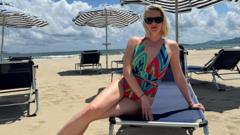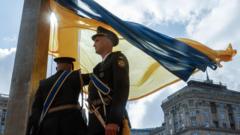Is North Korea's 'Benidorm' Worth the Restrictions and Guards?

This article explores the complexities and unique experiences of tourists visiting the Wonsan Kalma Coastal Tourist Zone in North Korea, highlighting the tightly controlled environment, the allure of exotic travel, and the underlying socio-economic implications. It reveals how this new resort, despite its restrictions, has captured the attention of Russian tourists looking for a distinctive vacation experience.
Last updated: 06 October 2023 (BST)
Key Takeaways
- The Wonsan Kalma Coastal Tourist Zone opened on 1 July 2023, aiming to boost North Korea's tourism sector.
- Access is currently restricted to Russian tourists, with tight controls on movement and activities.
- Concerns over human rights violations and the treatment of workers persist amid the resort's construction and operation.
- Despite challenges, interest in visiting the resort remains high among Russians, with many planning return trips.
- The resort is seen as a strategic move by North Korea to improve its economy through tourism.
Introduction to Wonsan Kalma Coastal Tourist Zone
Located on North Korea's east coast, the Wonsan Kalma Coastal Tourist Zone represents a significant attempt by the regime to open up to international tourism. This initiative aligns with Kim Jong Un's ambitions to enhance the country's economic prospects through tourism, an industry that has been largely dormant since the onset of the Covid-19 pandemic.
The Allure of North Korean Tourism
North Korea has long been a closed-off destination, offering a travel experience that is unique yet fraught with restrictions. The introduction of Wonsan Kalma, which combines modern amenities with the country's distinctive political landscape, presents an unusual opportunity for tourists seeking something different. The resort features hotels, restaurants, shopping malls, and even a water park, all built in a region historically significant to Kim Jong Un.
Why Wonsan Kalma Matters
The Wonsan Kalma resort not only aims to attract tourists but also serves as a symbol of North Korea's attempts to project a more modern image. The resort was reportedly inspired by popular tourist destinations such as Benidorm in Spain, suggesting that North Korea is taking steps to align itself with global tourism trends, albeit under a highly controlled framework.
A Controlled Experience
Tourists like Anastasia Samsonova, who travelled there in July 2023, experienced a tightly controlled visit. Accompanied by security guards and guides, she and her group followed a fixed itinerary, with strict rules that limited interactions with local citizens. Guides informed them that the guards were present to avoid startling locals who have lived in isolation for years.
Living in a Bubble
While the experience at Wonsan Kalma was described as luxurious and enjoyable, it was also carefully curated. Tourists were discouraged from taking photos of construction sites and were expected to adhere to a dress code that avoided revealing clothing. Nonetheless, the pristine beaches and well-maintained facilities left a lasting impression on many visitors.
Economic Implications of Tourism in North Korea
North Korea's economy has been under strain for decades, exacerbated by sanctions and global isolation. The introduction of controlled tourism is seen as a necessary strategy to generate revenue. The reported cost of a week-long trip from Russia to North Korea, approximately $1,800 (£1,300), is significantly higher than the average monthly salary in Russia, indicating a niche market for this type of travel.
Challenges Facing Tourists
Despite the allure of Wonsan Kalma, there are significant challenges for potential visitors. Access is currently limited to Russian tourists, with the North Korean government controlling the number and movement of foreigners within the country. Even Chinese citizens, usually more accessible due to geographic proximity, face restrictions.
Future of Russian Tourism in North Korea
The future of Russian tourism in North Korea remains uncertain. Although initial interest was high, plans for additional tours have been complicated by North Korean authorities' decisions. Travel agencies reported that tours initially slated for September were removed from listings, leaving many potential tourists in limbo.
Human Rights Concerns
Human rights groups have raised alarms over the treatment of workers involved in constructing and maintaining the resort. Allegations of forced labour, long hours, and inadequate compensation are persistent issues that cast a shadow over the potential economic benefits of increased tourism.
Local Perspectives
Experts suggest that the North Korean government is wary of the implications of opening up to tourists. Andrei Lankov, a noted North Korea scholar, points out that allowing too many foreigners could encourage locals to question their living conditions in comparison to wealthier visitors. This delicate balance between showcasing a modern image and maintaining strict control over the populace remains a central concern for the regime.
Tourist Experiences and Anecdotes
Anastasia’s experience illustrates the paradox of visiting North Korea: a blend of luxury and restriction. She described days filled with scheduled activities, including meals featuring local cuisine, such as meat dishes and inexpensive beer. The surreal juxtaposition of enjoying a beach holiday while under strict surveillance adds to the intrigue of the destination.
Unique Souvenirs and Local Culture
Tourists have remarked on the unique souvenirs available, including North Korean Olympic apparel and toy rockets, which reflect the region's unusual blend of culture and politics. These souvenirs serve as reminders of the complexities that define travel in North Korea.
Looking Ahead: What’s Next for Wonsan Kalma?
As interest in Wonsan Kalma grows, the question remains: how sustainable is this model of controlled tourism? With ongoing geopolitical tensions and the ever-present threat of sudden policy changes, the future of Russian tourists in North Korea and the broader implications for the country's economy remain uncertain.
Conclusion
Despite the restrictions and challenges in accessing Wonsan Kalma, the resort signifies a potential turning point for North Korean tourism. As more Russians express interest in returning, the question of how North Korea will manage this influx remains critical. Will the country find a way to balance tourism with its stringent control over local life and the international community's scrutiny? Only time will tell.
FAQs
What is the Wonsan Kalma Coastal Tourist Zone?
The Wonsan Kalma Coastal Tourist Zone is a new resort in North Korea aimed at attracting international tourists, primarily Russians, with amenities like hotels and a water park.
Who can currently visit Wonsan Kalma?
At present, only Russian tourists are allowed to visit Wonsan Kalma, and visits are tightly controlled by North Korean authorities.
What are the costs associated with visiting North Korea?
A week-long trip from Russia to North Korea, including stays at Wonsan Kalma, costs around $1,800 (£1,300), significantly higher than the average monthly salary in Russia.
What human rights issues are associated with Wonsan Kalma?
Human rights groups have raised concerns about the working conditions of those involved in the resort's construction, citing forced labour and inadequate compensation as issues.
What unique experiences do tourists report from Wonsan Kalma?
Tourists have described their experiences as surreal, enjoying pristine beaches and modern facilities while adhering to strict regulations regarding movement and behaviour.
Published: 2025-08-23 23:18:26 | Category: world



